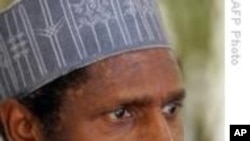Nigeria has expressed gratitude for the "solidarity of the entire African bloc" after the country was elected to a United Nations Security Council non-permanent seat Thursday.
<!-- IMAGE -->Foreign minister Ojo Maduekwe hailed the election, saying preventive diplomacy will be central to Nigeria's approach to issues.
Nigeria was elected with 186 votes along with its West African member country Gabon which received 184 votes.
Nigeria, has previously served three terms in a U.N. Security Council non-permanent seat, most recently between 1994 and 1995.
However this will be Gabon's first time serving.
Professor Kabir Mato, head of the political science department at the University of Abuja said that Nigeria worked tirelessly for the UN honor.
"It's a lot in the sense that Nigeria as a responsible member of the United Nations organization desires to have quite a lot of its foreign policy aims and objectives actualized through not just being an ordinary member but above that, playing a more serious role in the determination of the trend in international cycles," Mato said.
He described Nigeria's election as tactical.
"It is quite a very strategic achievement, and if properly used, I do believe sincerely that Nigeria will be able to impact positively by pushing through some very cogent economic and political issues that will not only affect Nigeria as a country, but above all Africa and the rest of the third world in general," he said.
<!-- IMAGE -->Mato said Nigeria previously served when there weren't calls for UN reforms.
"This is the first time Nigeria is occupying that seat on the threshold of the envisaged reform of the United Nations organization. The previous times that Nigeria organized that seat, the question of reforming the United Nations wasn't an item on the agenda. But it is now an item on the agenda," Mato said.
He said the Abuja government could play a pivotal role in the U.N Security Council.
"I do believe that if the country will play its role lucratively, very well, it will apparently boost its chances of becoming one of the representatives of Africa in the event that Africa will have more than one representative," he said.
<!-- IMAGE -->Mato said Nigeria has always employed "citizen diplomacy" in its interactions with the world.
"The central objective of Nigeria's foreign policy objectives today is… citizen diplomacy… Nigeria's foreign policy since independence has always been fashioned along the way of taking Africa as a centerpiece, but also projecting this image, projecting this objective on the basis of perhaps the quantum benefits that are likely accrue, not just to Nigerian citizens but those within West Africa as well as the African continent," said Mato.
He praised foreign minister Ojo Maduekwe for playing a central role in Nigeria's election.
<!-- IMAGE -->



